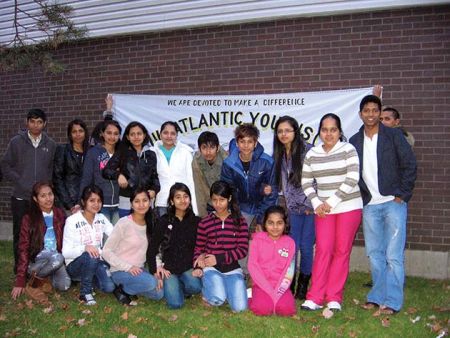They want to show off a song they wrote. First, they have to get through some quibbles over who gets the guitar and who plays the drums.
“We only have four lines,” says Rupesh Dhungana. “So the lyrics is about, ‘I am son of Bhutan, but I speak Nepali and I wear Nepali hat and Canadian coat.’”
Swelling voices fill a humid, low-ceilinged basement in Clayton Park with lyrics in Nepalese. (Listen to the song here.)
This room is home to Druk Atlantic Youths, a club for Bhutanese children who arrived in Halifax in 2009.
They’re part of the 80 multi-generational families who resettled in the city to escape refugee camps in Nepal.
Many Southern Bhutanese, like the members of Druk, are originally from Nepal, a country west of Bhutan.
In 1985, the Bhutanese government passed a citizenship act that targeted certain ethnic groups, including the Nepali-origin Lhotshampa of Southern Bhutan, claiming they upset the political order.
A census that same year singled out any Southern Bhutanese who could not prove they had lived in the country in 1958. Their citizenship was revoked.
Then came the laws: all Bhutanese had to wear northern traditional clothing. And Nepali, the language of the Southern Bhutanese, was banned from schools.
By the early 1990s, many Southern Bhutanese fled to Nepal because of these repressive measures, or because they were no longer recognized as citizens.
In 2007, Canada was one of several countries that pledged to accept Bhutanese refugees who had sat in limbo in Nepalese camps for over a decade.
Now, 4,500 have made their homes across the country, including more than 300 in row-by-row Killam Property bungalows.
“You know, when we came to Halifax, we feel like really protected, really secure,” says 21-year-old Druk Atlantic Youths co-ordinator Dhungana. “I think not only me — everyone is really happy to be here in Halifax.”
A dozen club members, packed onto an L-shaped couch and squeezed along a wall, nod in agreement.
“The technology’s totally different from here in Nepal,” says Dhungana, who periodically whips out his iPhone to check his Facebook account. There, “we do not have a car, we do not have a Superstore, McDonald’s — and when we came here, we found so many options.”
Options such as exploring African dance at the Black Cultural Centre for Nova Scotia.
Druk Atlantic Youths was formed just over a year ago to help members maintain their Nepalese culture and share it with others.
“First thing is we want to present our culture, tradition and our language,” says Dhungana. “And second thing is we are making platform for ourself to show our talent.”
The 25-member group has participated in concerts, festivals and dance performances around Halifax, and has travelled to Prince Edward Island to compete in soccer games against other Bhutanese refugees.
It also has four adult advisors who lead Nepali, art, dance and guitar classes.
The group holds skill-share workshops with community members as well, learning everything from how to best settle into Halifax to broadcasting a radio show.
Dhungana says “people from Western country: they have mind. But people from Eastern country: they have heart. We are full of heart to welcome people. We always say that guest is our god.”
On a wall opposite a Druk Atlantic Youths banner hang colourful poster boards decorated with comments about visitors the club has invited into its home.
The group has so far had sessions with people from Halifax’s Immigrant Settlement & Integration Services, the YMCA and New Roots Radio, a CKDU program.
But its members want to connect with other youth groups.
One issue is their cramped, concrete-floored meeting space; community centres are expensive to rent.
Another — bigger — issue is language.
“Whenever I say ‘problem’ just understand that it’s English,” says Dhungana’s 23-year-old brother and Druk member, Narayan.
Their mother, dressed, unlike her children, in traditional garb, sits with her back against the wall, silent. In Mana Maya Dhungana’s three years in Halifax, she’s learned only how to say her name in English
The transition to Canada has been tough on the club members’ parents. They owe the Canadian government thousands of dollars in travel loans, which many have not been able to repay because of trouble finding work.
“Most of our parents are farmers and they’re looking for jobs in the farm but there is no farm in Halifax,” says Narayan Dhungana. “You have to go out, out of the city and we don’t have car.”
To help supplement social assistance cheques, he says children who are old enough have found jobs as hotel maids, for example. They have a solid grasp on English thanks to English as a Second Language courses and the advantage of youth: it’s easier for children to learn a new language.
Despite this, it’s clear the parents’ struggle with language resonates with their children.
“Please, donate me your English. I’ll mentor my fluency and accent myself, like you do. I just want English, please, just English,” Rupesh Dhungana reads from a poem he’s written. (Listen to the entire poem here.)
“I want to know what they talk in radio and television, in street and in parking. I want to feel English songs and I want to learn English dance.”
Just as often as the group mentions the “problem” and everything that comes with adjusting to a new country, someone brings up how happy they are to be in Canada.
“We miss our home. We miss our friends, we miss our culture, we miss our traditions,” Rupesh Dhungana says. “We miss everything but we didn’t miss our government.”
Few think they’ll ever return to Nepal.
Three years after their big move, the Druk Atlantic Youths members are veritable Canucks.
“We are Canadians but we never neglect our identity, too,” says Rupesh Dhungana. “We are Nepalese-Canadians — something like that. We feel proud to be Canadians.”
“We are no more refugee,” whispers one girl.
This article was originally published in the Halifax Commoner.



